Bitcoin is not just an asset; it is a greater choice we leave for the next generation.

Ten years ago, Bitcoin was a technological novelty; ten years later, it has become a global consensus on value.
If buying Bitcoin was important a decade ago, today "leaving a bit of Bitcoin for the kids" might be the most visionary decision.
A house may be subject to purchase restrictions, depreciate, or even become obsolete; whereas a Bitcoin is a free asset that can cross borders and resist risks.
It is not just an asset; it is a greater choice we leave for the next generation—a life with more possibilities that is not defined by the system.
As Children's Day approaches, let's start from the real perspectives of industry practitioners and discuss a bold yet realistic question with OKX:
How do top crypto dads pass on their Bitcoin legacy to ensure their "crypto kids" win at the starting line?
1. @Shen Yu (Co-founder and CEO of Cobo)
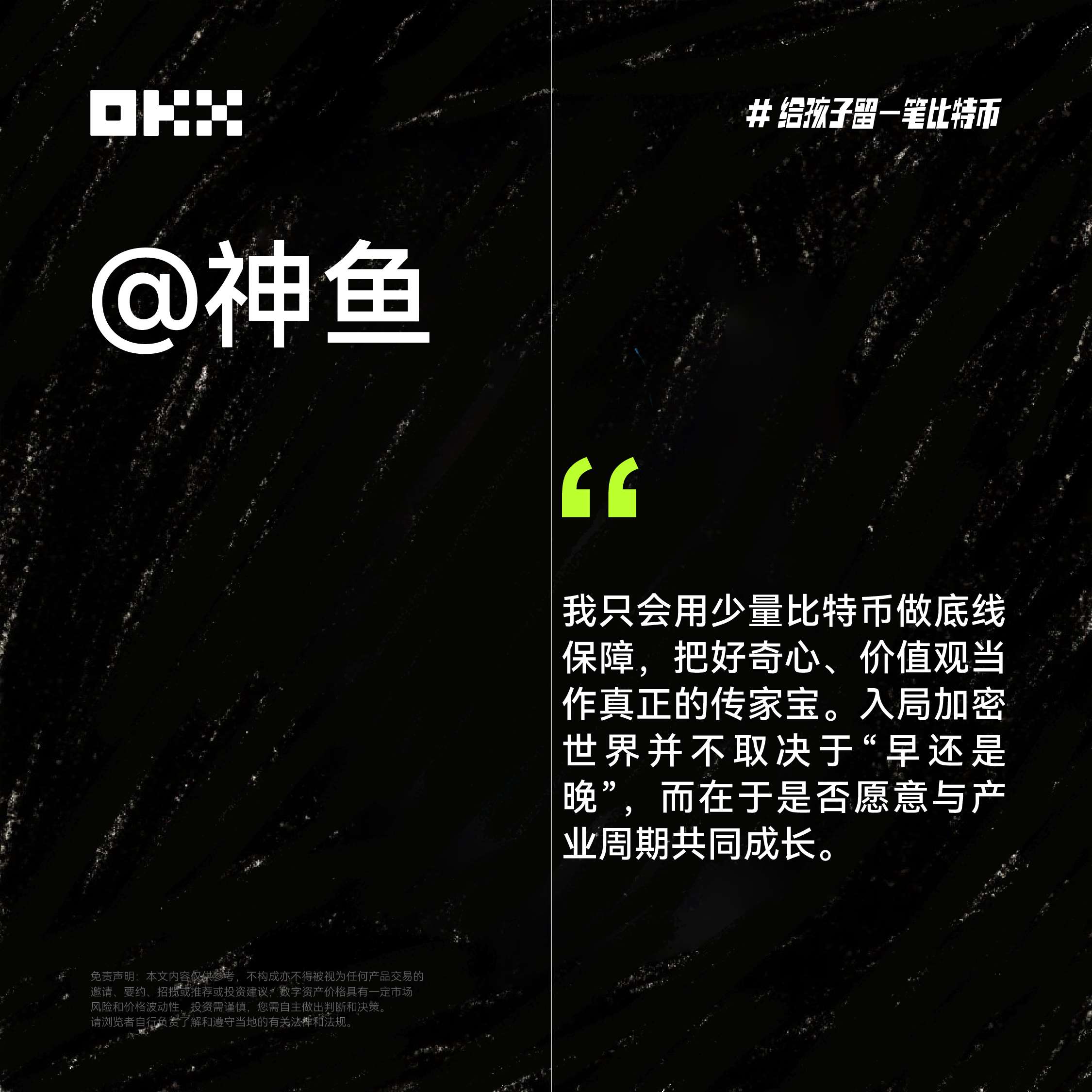
Q: For you, is "leaving a bit of Bitcoin for the kids" more of a belief or a hedge? Many people worry that it's too late to enter the market now; what do you think about the timing for "ordinary people to get involved"?
A: Although I used to think this way and planned to leave some BTC for my child, my perspective has changed this year—excessive crypto assets can easily weaken their curiosity and sense of responsibility. I will only use a small amount of Bitcoin as a safety net, treating curiosity and values as the true family heirlooms.
For ordinary people, entering the crypto world does not depend on whether it is "early or late," but rather on whether they are willing to grow alongside the industry cycle. Today's market infrastructure, regulations, and application ecosystems far surpass those of the past, bringing higher survival probabilities while compressing the space for excessive profits. Latecomers should: first assess their risk tolerance and cash flow, decide on a long-term position they can bear; use dollar-cost averaging instead of a lump-sum investment to spread timing risks into time dividends; view buying Bitcoin as a ticket to learning, tracking technological evolution, and experiencing practical applications, allowing cognition and assets to appreciate in sync. In this way, missing the early stage does not mean losing the opportunity; participating with a clearer perspective yields a more stable compounding curve rather than volatile spikes and drops.
2. @Ni Sen (Top KOL)
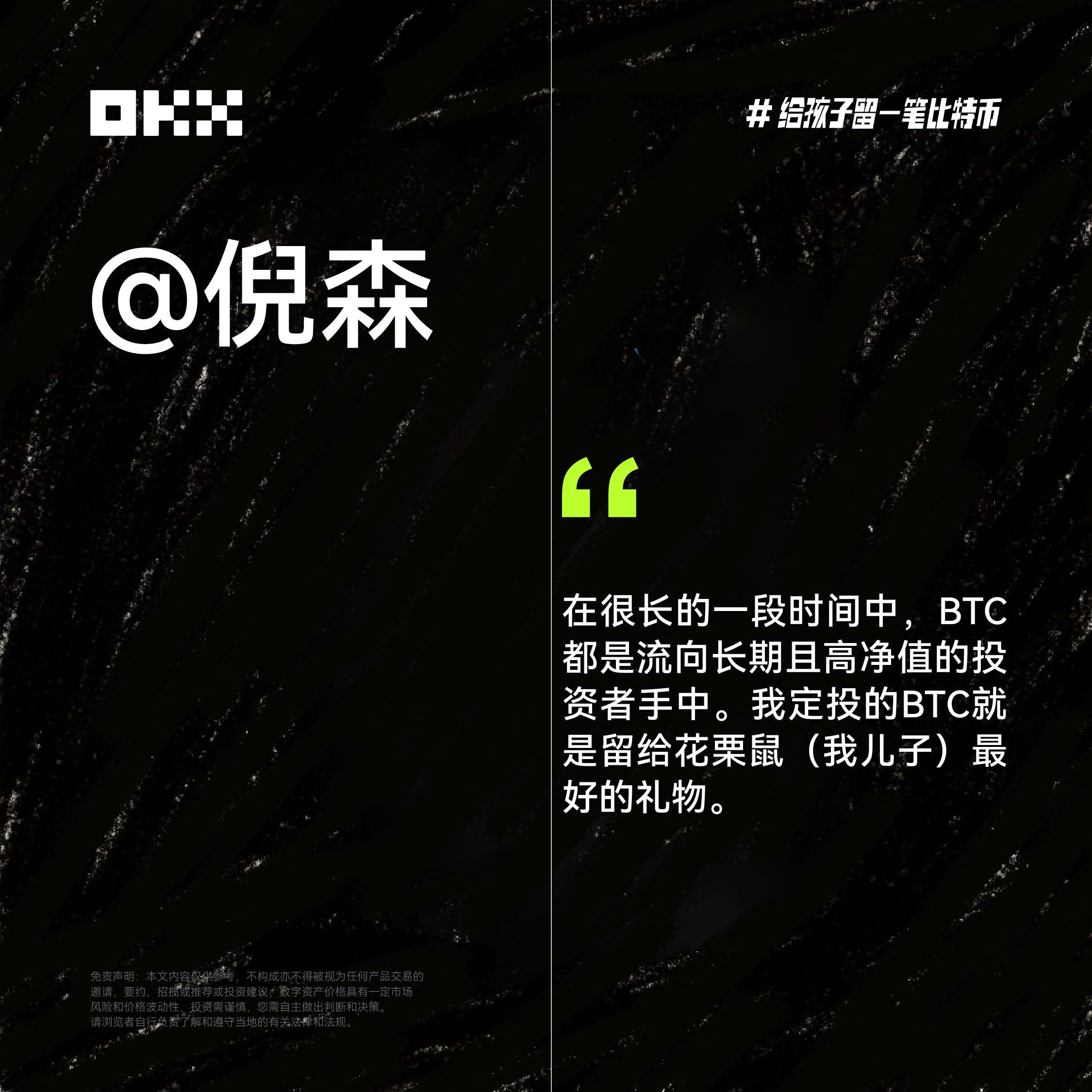
Q: What do you think about the increasing number of people who "question Bitcoin as a scam" starting to quietly dollar-cost average? Some say "trading gold is about preservation, trading Bitcoin is about the future"; do you agree? If a parent who doesn't understand crypto asks you, "Can I really leave Bitcoin for my child? Is this reliable?" how would you respond?
A: As a long-term dollar-cost averaging BTC trader, I firmly believe in BTC's future. Compared to gold, BTC's hedging properties are indeed not very strong, as its price volatility is quite significant. However, as BTC moves further into compliance and more high-net-worth traders are willing to use BTC as a trading strategy, I believe BTC's future will be better.
Additionally, I want to say that data already shows: for a long time, BTC has flowed into the hands of long-term and high-net-worth traders. The data from 13F filings and spot ETFs indicate that the amount of BTC held by high-net-worth traders and institutions in the U.S. is increasing, which will also drive the "dollar-cost averaging" herd effect. Since I first bought BTC in 2018, I have been increasing my BTC position, with monthly dollar-cost averaging. This BTC is the best gift I can leave for my son, and I believe BTC can play a greater financial role in the future.
3. @UNICORN (Top KOL)
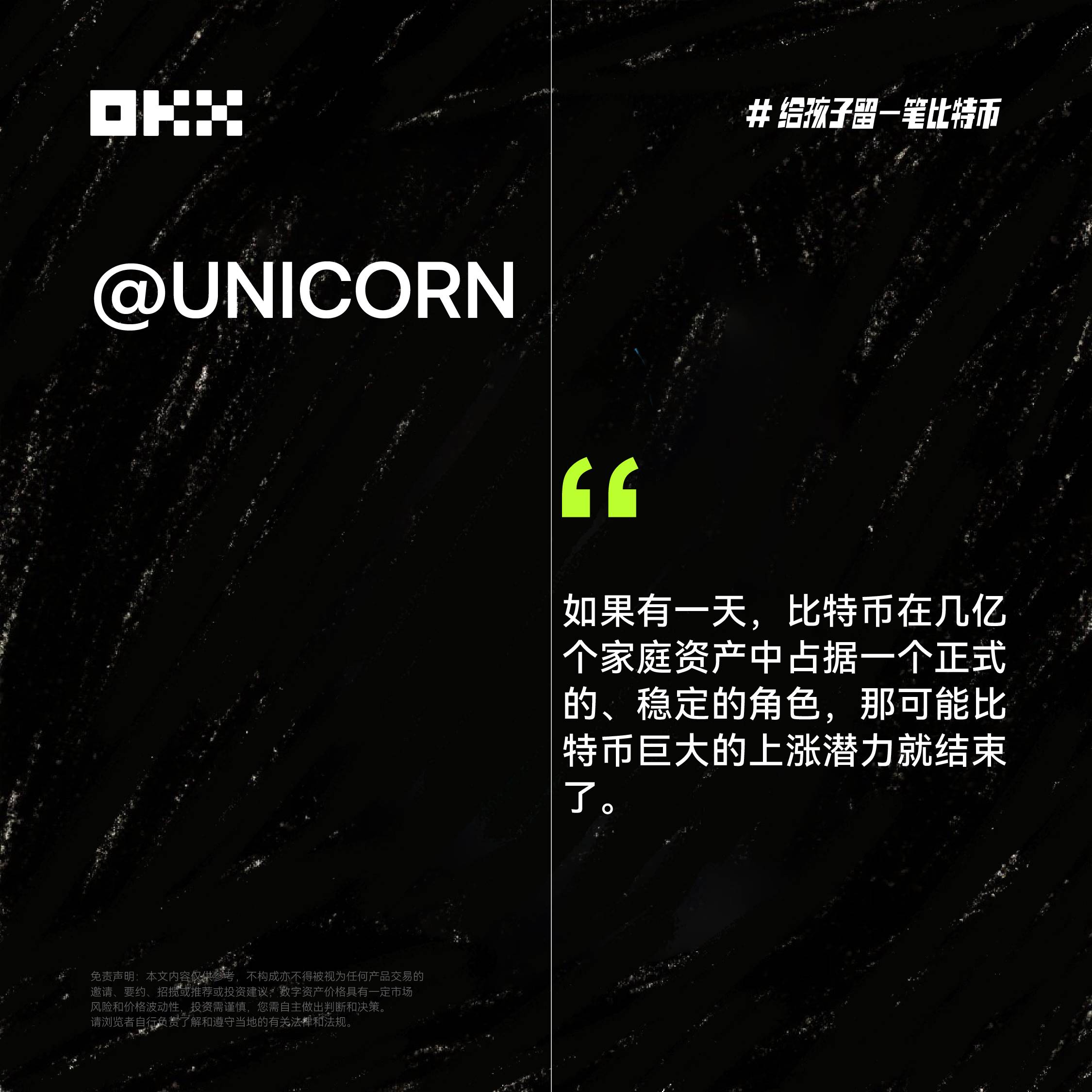
Q: "Leaving a house for the child is not as good as leaving a Bitcoin"; do you think this statement is reliable? Or how would you interpret the anxiety and hope behind it? Do you think Bitcoin can occupy a formal and stable role in family assets in the coming years?
A: From the perspective of growth potential, Bitcoin has a very large increase and unlimited potential. For example, it could reach a million dollars, but it requires a process, and the time is unknown; it may take many years. However, a house, like one currently worth a million dollars, has limited growth potential, far below that of Bitcoin, but is currently valuable. So, it might be more reliable to say "leave 10 Bitcoins instead."
It varies by family; this world rewards the first wave of people who embrace new things. For me, Bitcoin is already such a family asset, but if one day Bitcoin occupies a formal and stable role in millions of families, then the huge growth potential of Bitcoin may end, becoming an asset that increases by less than 30% a year like gold. In that case, I might have to look for the next asset with higher growth potential.
4. @Mandy (Founder of Odaily Planet Daily)
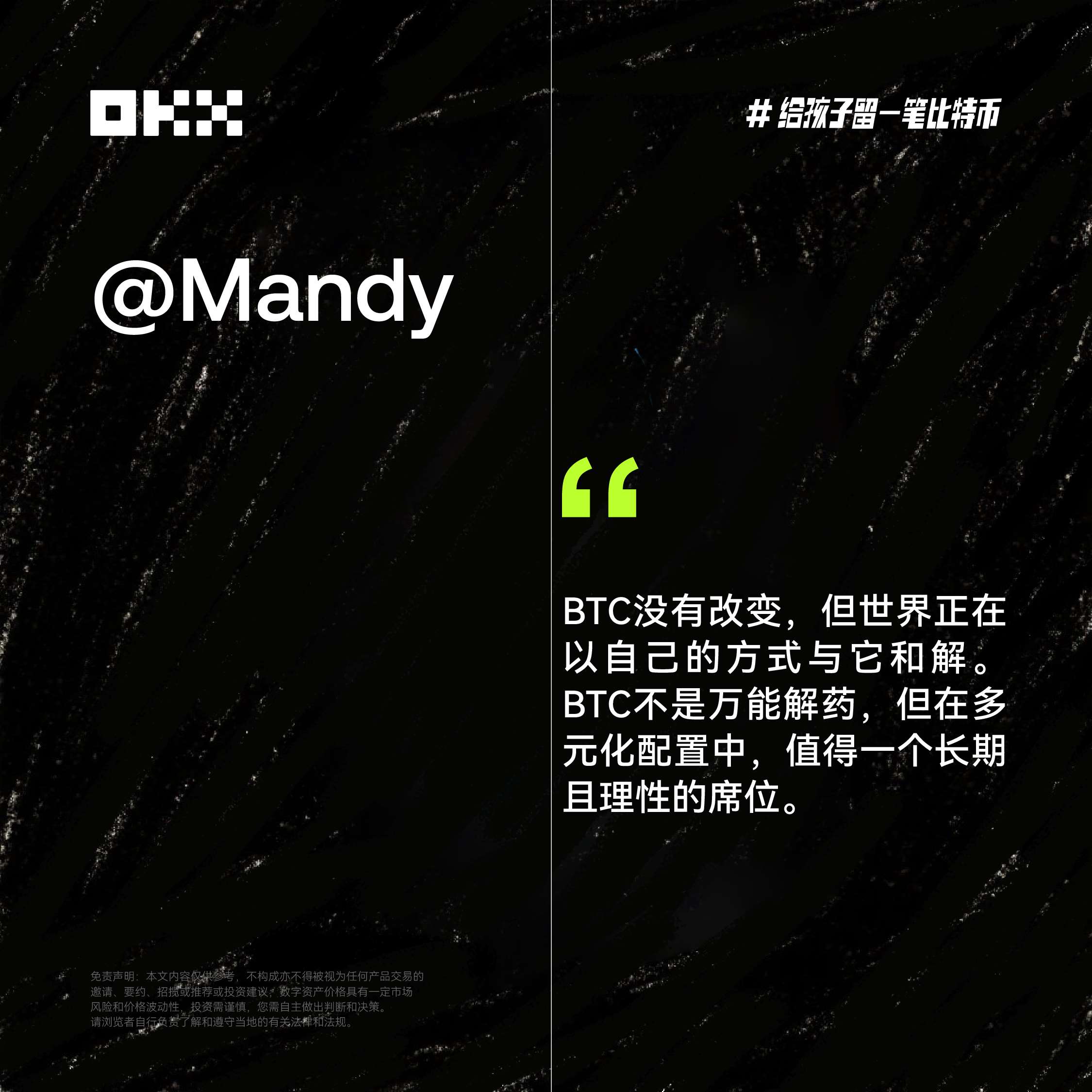
Q: From a media perspective, how do you view Bitcoin's "reputation reversal" over the past decade? Do you think it's time to seriously discuss "making Bitcoin part of family assets"?
A: Bitcoin's "reversal" is essentially a re-recognition of its value by the mainstream world. Ten years ago, it was seen as a marginal technology challenging regulation; now, exchanges are moving towards compliance, multiple countries have established clear regulatory frameworks, and Bitcoin ETFs in the U.S. have achieved trading volumes in the hundreds of billions. This is not only a systemic acceptance of Bitcoin's underlying logic but also a rebranding of it within the global asset allocation system. When Wall Street begins to enter the market and policies gradually standardize, Bitcoin has transformed from a "rebel" into "part of the system." It has not changed, but the world is reconciling with it in its own way.
Yes, especially from a global perspective, this is no longer a cutting-edge topic but a realistic consideration. High inflation, frequent wars, and currency devaluation have become common in many countries, making the "cross-system security" of family assets increasingly important. Bitcoin, as a decentralized asset that does not rely on any single sovereignty, provides a logically sound alternative. More importantly, its total supply is fixed, institutions continue to enter, and global consensus is expanding, which still provides price support due to its scarcity in the long run. It is not a panacea, but in a diversified allocation, it deserves a long-term and rational position.
5. @Liam (Founder of Deep Tide TechFlow)
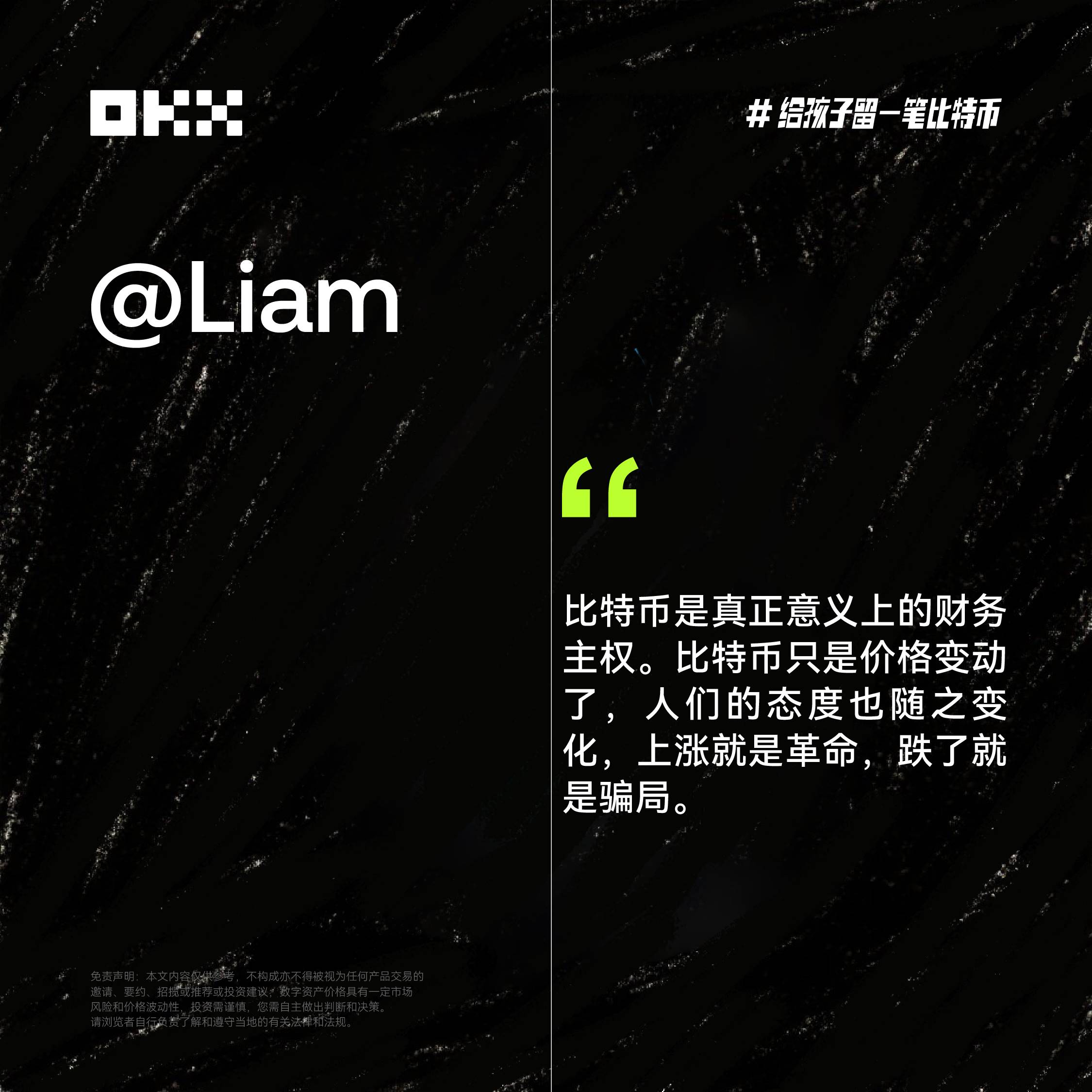
Q: As a seasoned media person, what do you think has "changed" about Bitcoin over the past decade? What has "not changed"? What does Bitcoin mean to you? What is your personal trading logic and allocation method?
A: The main change in Bitcoin is external. Ten years ago, it was a toy for geeks; now it has entered the trading portfolios of global listed companies, evolving from a niche experimental project into a mainstream asset, with prices rising from a few dollars to over a hundred thousand dollars. Meanwhile, the ecosystem built around Bitcoin has become increasingly complete, from trading infrastructure to derivative applications, giving rise to a whole new digital economy.
What has "not changed" is internal. The core principles of Bitcoin remain unchanged, such as the total supply of 21 million and the POW mechanism. More importantly, Bitcoin's narrative about combating inflation and maintaining wealth sovereignty has not only remained strong over the past decade but has also been repeatedly validated and reinforced amid global financial turmoil. You see, Bitcoin is still the same Bitcoin; only the price has changed, and people's attitudes have shifted accordingly—rising is revolution, falling is a scam. Life is quite similar; when your life line rises, all you hear are praises and cheers; when your life line falls, all you hear are doubts about scams. Self-improvement is crucial; one should be like Bitcoin.
When I first learned about Bitcoin, I was deeply impressed by a statement from Li Xiaolai, who said that Bitcoin is the first time in human history that technology has made private property sacred and inviolable. In my view, this is Bitcoin's value—true financial sovereignty. So, for me, Bitcoin is like life-saving money, and I also adhere to the idea of "saving enough Bitcoin for the next generation," treating Bitcoin as a legacy, of course, provided there is a next generation. Regarding Bitcoin, I have suffered too many losses; for example, I once had more than one Bitcoin on an exchange that later ran away, and I also sold Bitcoin to buy a certain altcoin based on "friend recommendations" and "insider news" before a bull market, resulting in a 70% loss. So now, my choice regarding Bitcoin is just to hold it; I don't aim to trade it in waves, as I will eventually lose it. Recognizing what kind of person you are is very important.
6. @Wesley (Silicon Valley Chinese Entrepreneur in Web3)
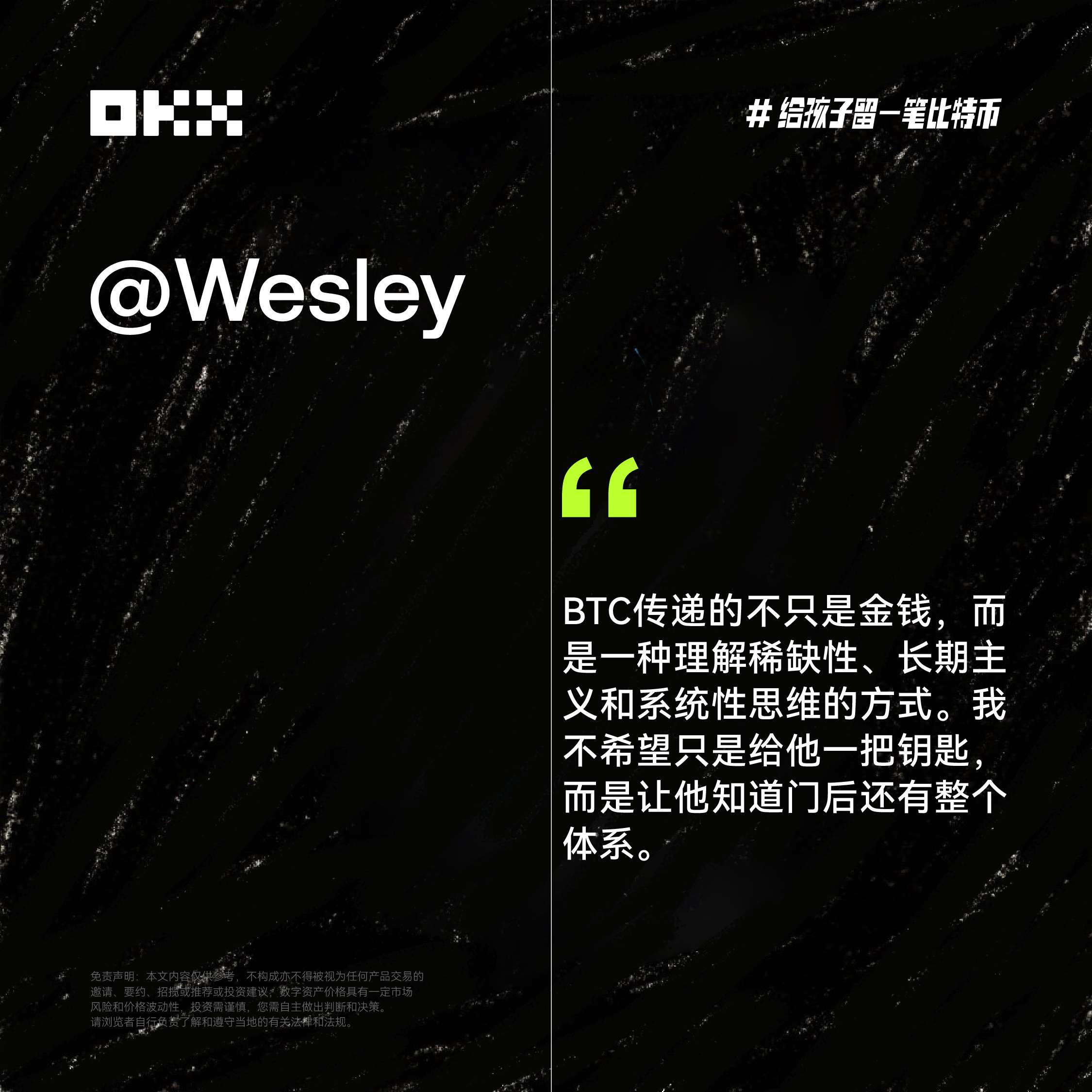
Q: What do you think is the biggest misconception the public has about Bitcoin? From an asset allocation perspective, is it bold or reasonable to include Bitcoin in a child's "starting line"? If you really decide to leave a bit of Bitcoin for your child, when would you choose to tell him? What do you hope this asset will convey?
A: From an asset allocation perspective, I think this is not "bold," but "forward-looking." What you leave for your child is not just a sum of money, but a stepping stone to participate in the future global value reconstruction. If I were to leave a bit of Bitcoin for my child, I might not tell him too early—I hope that after he turns 18, he has his own understanding of "value" before opening this "time capsule." Let Bitcoin accompany him as he grows. This asset conveys not just money, but a way to understand scarcity, long-termism, and systemic thinking. I don't want to just give him a key; I want him to know that behind the door lies an entire system.
7. @Jeffrey (Operations Director of PANews)
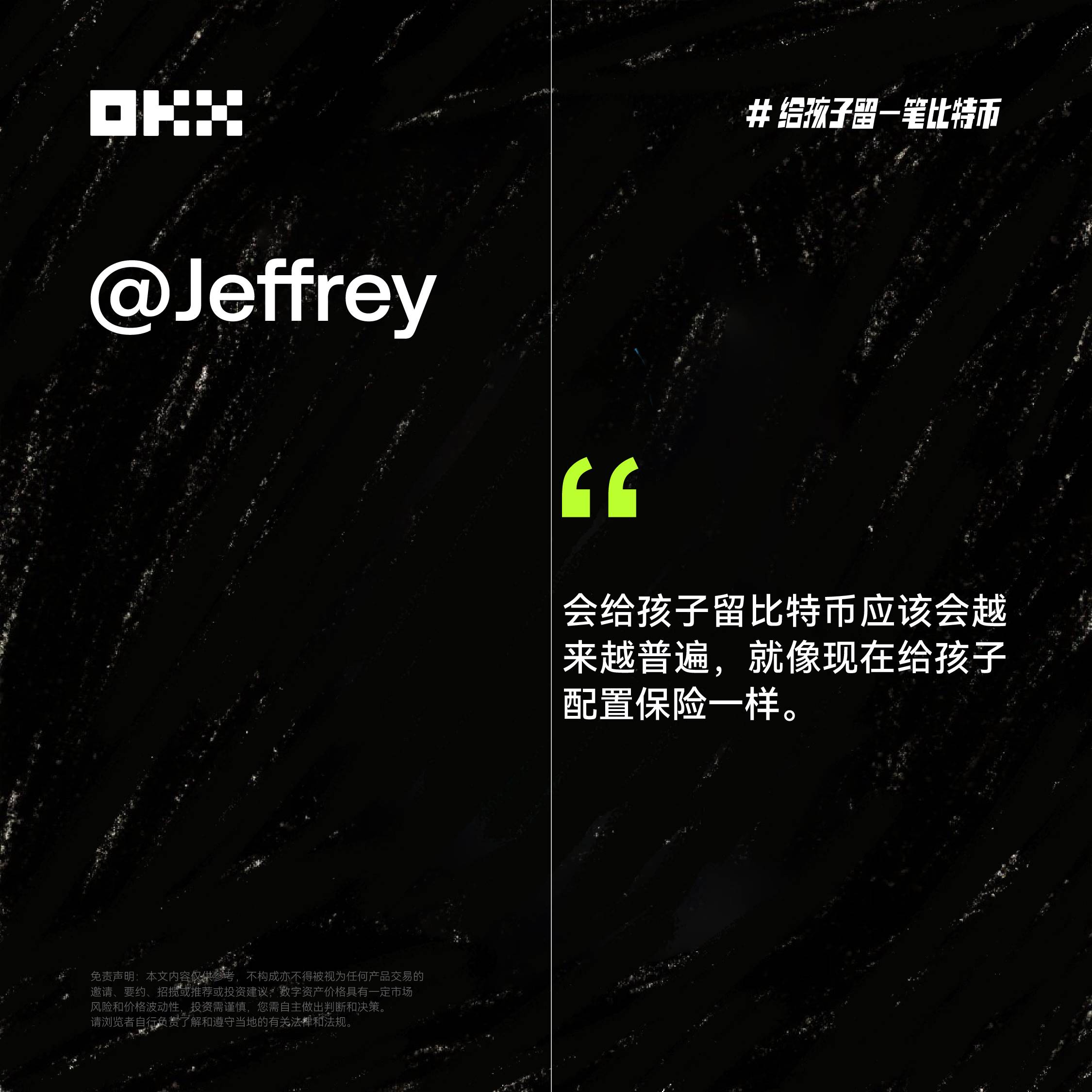
Q: If it were you, would you leave a bit of Bitcoin for your child? Is this driven by emotion or cognitive choice? As a parent, how do you view the idea of "leaving Bitcoin for your child"? How would you explain the "meaning of Bitcoin" to your child?
A: The answer is yes, and I have already done so. I believe many crypto parents would do the same. It's a dual drive of cognition and emotion. Cognition determines what I do, while emotion determines how much I leave. Each generation has its own gold, just like the older generation buys gold for the next generation. I will also buy a certain amount of Bitcoin on important days, such as the birth of my child, during the New Year, or during market crashes, and transfer it to a wallet prepared for my child. By the way, I have also accumulated some Ethereum for my child.
I think this idea will become increasingly common, just like providing insurance for children today. At this stage, I won't explain the meaning of Bitcoin to my child. This generation is born or lives in an era of information explosion and is also in the era of crypto moving towards mass adoption. Their understanding of crypto assets and Bitcoin should gradually accumulate through learning, socializing, and daily use. Of course, during their growth, it is necessary to help them establish the correct values and worldview. When they have a certain understanding of money and consumption, I will allow them to manage a portion of the Bitcoin.
### 8. @Tiny Bear (Initiator of the DChain Community)
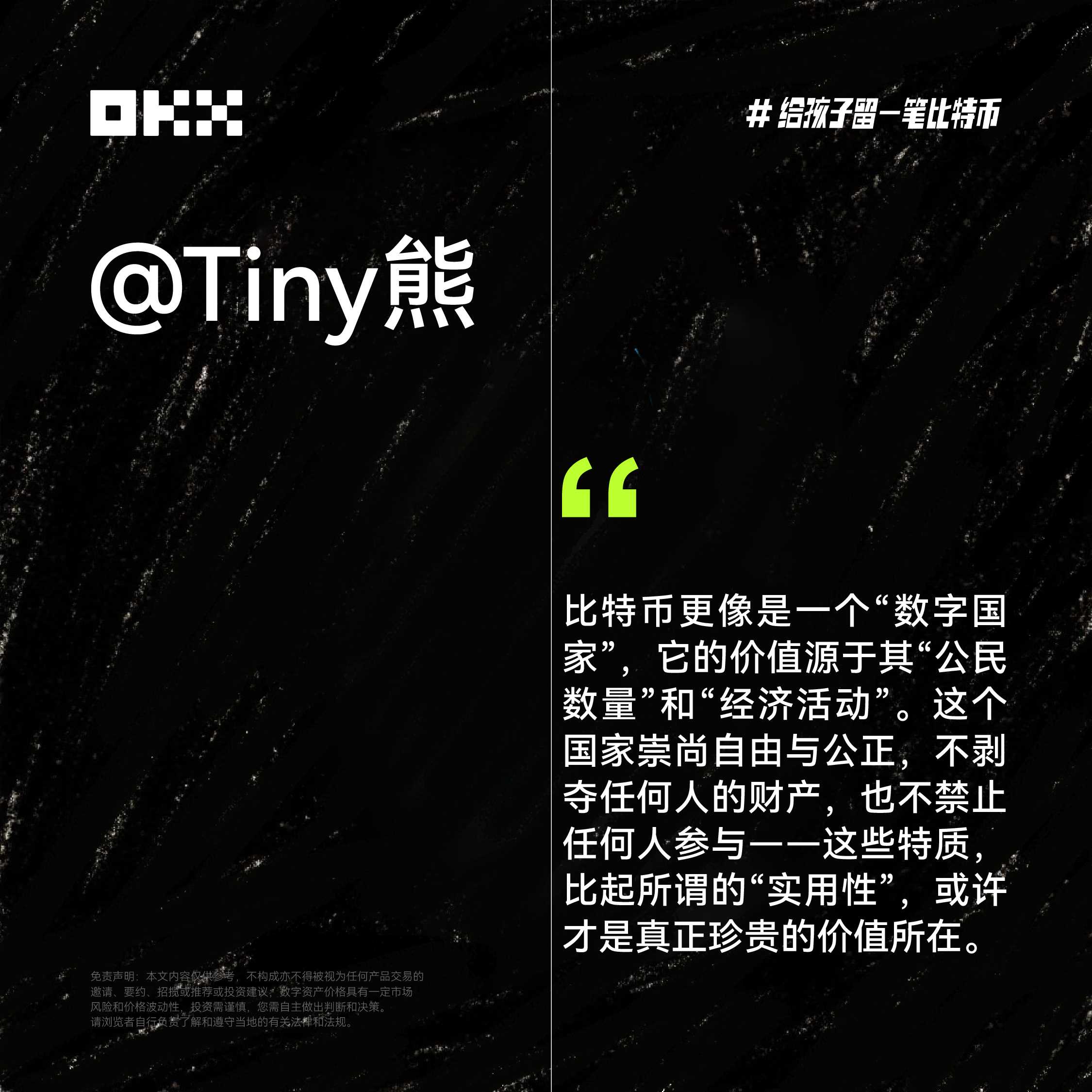
Q: How do you view Bitcoin? From a parent's perspective, what do you think is the value of allowing children to own Bitcoin?
A: Many people are accustomed to using corporate valuation logic to measure Bitcoin's value, believing that from a "utility" perspective, Bitcoin seems to lack a truly usable "product," leading to the conclusion that it should not be valuable. However, in my view, Bitcoin is more like a "digital nation," and its value comes from its "number of citizens" and "economic activities." This nation values freedom and justice, does not deprive anyone of their property, and does not prohibit anyone from participating—these qualities may be the truly precious values compared to so-called "utility."
Allowing children to own Bitcoin is a way to help them understand "long-termism." Life is similar; in the short term, we may be at a low point or briefly at the top. But we hope our children do not get too caught up in momentary gains and losses, but rather learn to focus on themselves and maintain composure. Just like Bitcoin, the returns in life also come from the compounding effect of time.
9. @Tony Li (Post-Investment Director at Dragonfly)

Q: What does Bitcoin represent compared to traditional assets like real estate and gold? Has Bitcoin become part of your family's asset allocation? Why?
A: After nearly ten years in the industry, Bitcoin is a deep belief for me. It represents a new paradigm of assets that is more efficient, freer, and more resistant to risks. Compared to traditional assets like real estate and gold, Bitcoin's core advantages mainly lie in three aspects: better efficiency and liquidity, greater long-term value storage potential, and better ability to respond to global changes and risks.
Yes, Bitcoin is now a significant part of my family's asset allocation. I believe it is the asset that will benefit our next generation the most. If I had to choose one asset to leave for my child, it would definitely be Bitcoin, along with the belief in Bitcoin.
### 10. @On-Chain Expert (Top KOL)
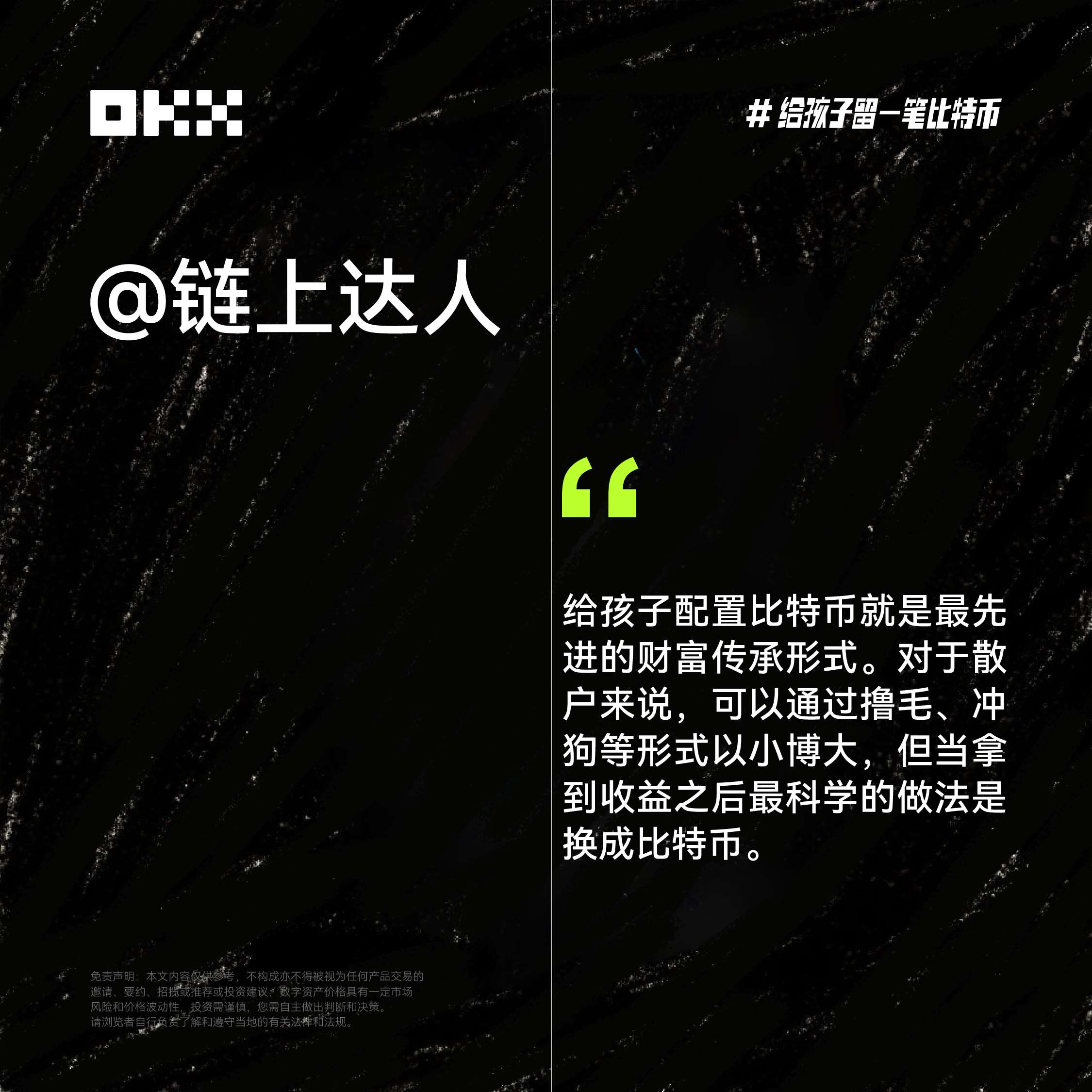
Q: The increasing number of parents seriously considering allocating Bitcoin for their children indicates what? How has your view of Bitcoin changed compared to the past? Why has this change occurred?
A: Bitcoin has become a mainstream asset, even comparable to traditional financial assets. The consensus around Bitcoin is continuously expanding, and many parents now view Bitcoin as a long-term trading tool, similar to buying education funds for their children. The traditional financial system has many unstable factors, and Bitcoin can perfectly address these pain points. Allocating Bitcoin for children is the most advanced form of wealth inheritance.
The biggest difference is the understanding of trading returns. In the past, I thought Bitcoin's market cap was too large, and its growth potential was not as good as altcoins. Retail investors believed that buying altcoins or memes could change their fate, so I accumulated a bunch of altcoins, memes, and NFTs. However, most of those assets did not rise as much as Bitcoin and fell even more sharply. The reason is that as more institutions and outside users enter the market, Bitcoin is recognized as the preferred trading choice. For retail investors, they can take small risks through various means, but the most scientific approach after gaining profits is to convert them into Bitcoin.
Disclaimer:
This article is for reference only. It represents the author's views and does not reflect the position of OKX. This article does not intend to provide (i) investment advice or recommendations; (ii) offers or solicitations to buy, sell, or hold digital assets; (iii) financial, accounting, legal, or tax advice. We do not guarantee the accuracy, completeness, or usefulness of such information. Holding digital assets (including stablecoins and NFTs) involves high risks and may fluctuate significantly. You should carefully consider whether trading or holding digital assets is suitable for you based on your financial situation. Please consult your legal/tax/investment professionals regarding your specific circumstances. You are responsible for understanding and complying with applicable local laws and regulations.
免责声明:本文章仅代表作者个人观点,不代表本平台的立场和观点。本文章仅供信息分享,不构成对任何人的任何投资建议。用户与作者之间的任何争议,与本平台无关。如网页中刊载的文章或图片涉及侵权,请提供相关的权利证明和身份证明发送邮件到support@aicoin.com,本平台相关工作人员将会进行核查。




